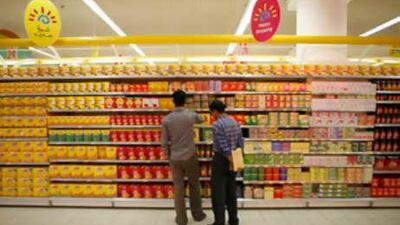International factors contributing to the UAE's highest inflation rate in two decades have eased in the last month, with fuel and food prices dropping to levels not seen for a year. The falls are in line with last month's forecast by Mohammed Ahmed bin Abdul Aziz al Shihhi, the undersecretary to the Minister of Economy, that lower global food and fuel prices would help reduce the rate of inflation in the country.
In addition, the dollar - to which the dirham is pegged - began to gain this month, helping to ease the price of imported goods. The dollar's weakness over the last year and a half has been a principal cause of imported inflation in the UAE and GCC countries because the UAE imports nearly all its consumer goods. "Some of the causes behind the inflation outburst have lost strength or even started to reverse themselves as in the case of the dollar and rice [prices]," said Fabio Scacciavillani, an economist at Dubai International Financial Centre. "If these forces are not countered by domestic prices, mainly the jump in property prices, it seems that inflation will be lower beginning in October or November."
Abraham George, purchasing manager at Bani Yas Co-operative Society, said food prices have remained largely stable this summer. He attributed the stability to new products in the market, such as Purvee rice, and the Government's intervention in setting ceiling prices. It is too early to see if lower food commodity prices will lead to lower grocery bills for UAE consumers. The price of rice is also down. Indian rice has been steadily declining since the beginning of the month, while unfinished rice, also known as rough rice, is down nearly 30 per cent from its peak in April. Thai rice is also cheaper.
More good news is on the horizon as it appears that there will be more rice on the market shortly. Rice producing countries such as Vietnam have increased planting while India said its production would climb by five per cent this year. The drop in the price of steel is also helping to reduce inflationary pressure. Reinforced steel, known as rebar, declined to $1,050 (Dh3,853) per tonne from as high as Dh5,500 in June as prices in the global markets have steadily decreased since the middle of June.
Oil prices have declined more than 10 per cent since last month, while the high price of diesel in the UAE, which has been blamed for increasing the cost of transportation, is down more than 20 per cent to Dh17.25 ($4.70) per gallon. The dollar's revival and lower prices for food and fuel, however, do not address the leading cause of the country's inflation, which are rising property and rental costs in a market that cannot meet demand.
Rental costs contributed nearly 18 per cent to last year's inflation figure. Rental costs in Abu Dhabi, for instance, rose 58 per cent last year because of the sudden influx of newcomers to the emirate. The Government has since capped rent increases to seven per cent. Last month the Department of Planning and Economy suggested that the Government should increase supply of low- and moderate-income housing by introducing zoning laws.
Officials do not expect the inflationary pressure on rental prices to be relieved until the middle of next year when supply can meet demand. @email:mjalili@thenational.ae

